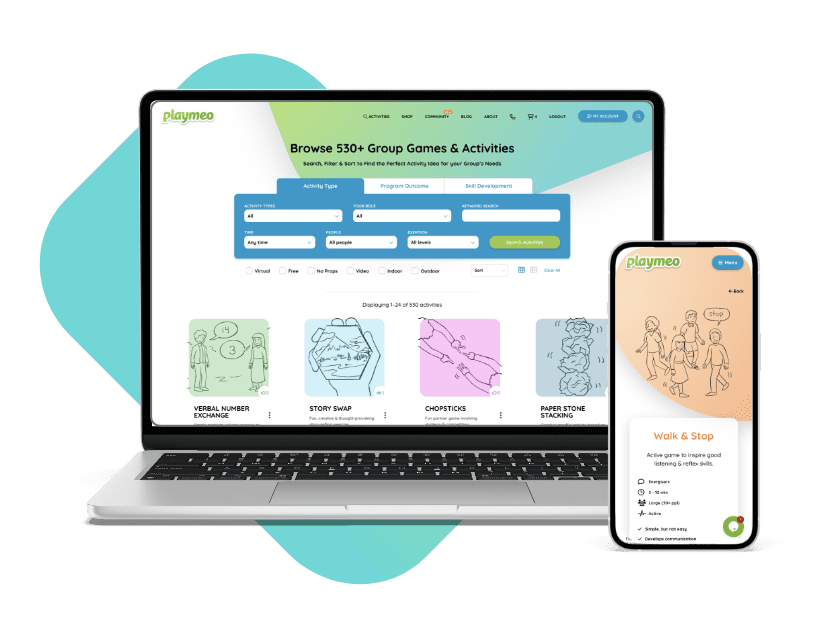How Do You Ask Engaging Debriefing Questions?
Welcome to the fourth & final instalment of our short series of video tutorials focused on processing, reflection or debriefing skills.
This week’s Facilitator Tips episode explores the $64 million question – how to ask good debriefing questions.
<< Go to Episode 46 Go to Episode 48 >>
If your notion of a good debrief or reflection time is to form a circle and ask a series of questions, then you’re in for a treat. Forming and framing good questions is half the battle.
As you will learn from this video, you must also focus on your tone, brevity and timing to get it right.
Click the play button above to learn more about the subtleties of asking good debriefing questions.
Want to join the conversation?
Please leave a comment at the bottom of the page (you must be logged in.)
Don’t have a playmeo account? Join today.
Useful Links & Resources
- Why Debrief – the first in our series of video tutorials focused on group processing skills.
- What To Debrief – the second in our series of video tutorials focused on group processing skills.
- When To Debrief – the third in our series of video tutorials focused on group processing skills.
- Useful Debriefing Tips – a bunch of useful and practical tips to help you lead an effective reflection session with your group.
- Debriefing Wiki – still looking for more resources to sharpen your reflection or debriefing skills, click the link.
- Reflective Practice – tons of links and resources to inform and guide your reflection skills, brought to you by Wikipedia.
- 4 Powerful Questions with less than 4 Words – a recent blog article that I think you’ll enjoy. There is beauty and simplicity in brevity.
…EE
Video Transcript
Hello and welcome back to the Facilitator Tips video series.
My name is Mark Collard, I work as an experiential trainer and author, and we’re now looking at Episode 47, the fourth in four episodes we’ve dedicated to the debrief or the process or the reflection. We’ve looked at the why, the what, and the when, and now I want to look at how.
Although to be fair, in Episode 32 we actually looked at the experiential learning cycle and a sequence of ways in which you can actually create a model for the way you structure your questions and the way you actually go about how you do your debrief. So I refer you to that. But I’m going to focus particularly on how do you ask good questions, how do you actually lead an effective debrief. And this is the skill that many of us, even those experienced facilitators often don’t feel the most comfortable.
First of all, as I’ve said I refer you to the experiential learning cycle. This is a very popular and common framework that provides a structure if you’re not quite sure where to start and what to do next. Again, Episode 32 will give you some good links.
Framing, just in the same way you need to frame the experiences that you’re leading with your group, you also should frame the debrief, the process, the reflection. If you don’t give the chance for your group to get their head in the right space, sometimes they could be all over the shop, and therefore makes your processing less effective. So think about how you’re going to frame, how do I get my group prepared to think and to reflect about their experience.
And pause. Pause says so much and can be so powerful. Even just those two seconds will attract people’s attention. Don’t be afraid when you ask a question for there to be a little bit of silence. Some people need time to think. Others are looking for other opportunities to actually invite someone else to speak. If you try to fill the space all the time the group will get used to that and they won’t bother to even put the energy into answering your questions because they know that you’re just going to fill it in for yourself.
Short questions. Oh boy. This is something I learned really quickly. I might have the best question to ask, but if my preamble and the actual question is so complex and long, if one of the responses you get is could you ask that again, yeah, you’ve got a problem. Keep your questions short. You could always ask more if you felt like it didn’t hit the spot, but keep them short, keep them brief to keep them coherent.
And then finally you’ve got to connect it to your goals, to the why of your experience. That’s more about the question, remember it’s about framing your questions. It needs to relate to what you’re trying to get done. Otherwise, people go why are we talking about that. It doesn’t make sense to them. And that is always a question your group is always going to ask in their mind is, why are we doing this, why are we asking this question or why are we answering this question. That’s a really important piece.
Okay. That brings us to the end, our fourth in a series of episodes that are focused really briefly on the highly refined skill, the art and science of processing or debriefing or reflection.
I would really encourage you to make some comments if you’ve got some ideas you would like to share, and certainly go to show notes, www.playmeo.com Episode 47, and you will see a whole lot more information that we can share with you.
Otherwise, I look forward to seeing you in the next episode in the series.
Bye for now.







There are currently no comments